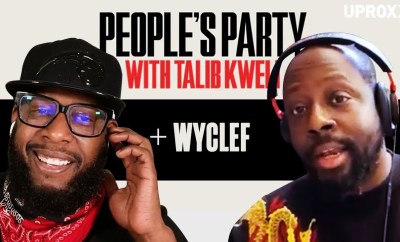In this episode of People’s Party, Talib Kweli and Jasmin Leigh sit down Grammy Award-winning rapper, musician, producer, actor, and activist — Wyclef Jean. This thorough interview covers his ambitious career that influenced and inspired so many with his signature success in pushing the multi-cultural boundaries within hip-hop.
The discussion starts off with Wyclef’s move from his native Haiti to the US at age 9, and landing in Brooklyn. He talks about finding his calling to hip hop through battle rapping in the park as a youngster. Clef goes on to speak on the importance of Pras and John Forté to the Fugees and how pivotal they both were to the group’s success. He also speaks on what it was like growing up a Preacher’s son, and talks about how growing up in both Brooklyn and Newark, NJ influenced him in different ways. They also discuss lessons learned from the Haitian Revolution, Clef’s encounter with Police brutality, being determined to change the anti-Haitian attitudes through his success, and uniting Haitians and Jamaicans.
The interview circles back to music and Clef is asked about how he was influenced by underground hip hop and how he knew the album ‘The Score’ would become such an iconic album. He discusses the genius of producer Salaam Remi and his contributions, reflects on the Fugees break-up and states the advice he would give his younger self during that difficult time. Clef also speaks to how much Reggae has influenced his style of hip hop and performances, and tells us who he feels would be the best possible fit for him in a Verzuz battle.
Later Talib notes Clef’s success in remaking iconic songs of the past from any genre he chooses and turning them into modern-day hip hop classics, explaining how he’s always been on a quest for musical fusion. He also talks about seeing the enormous potential of Destiny’s Child when he worked with them on their debut album, and how Beyonce was clearly destined for greatness. Clef goes on to talk about working with Whitney Houston, speaks on his experience attempting to run for president of Haiti, lays out lessons learned there, and also gets into the collapse of his Yéle Haiti charity, being accused of stealing from the $16 million raised. Clef then talks about working with Young Thug, lessons learned from his idol Quincy Jones, he answers how he balances his Haitian gangster affiliations with stardom, talks about his music company dedicated to seeking out and signing talent in third-world countries, and gives his take on the future of musical fusion.






